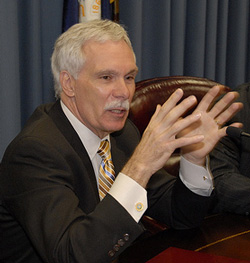The development of agriculture-based biofuels is critical to revitalizing rural communities, according to U.S. Secretary of Agriculture Ed Schafer.
 Speaking to farm broadcasters meeting in Washington, Schafer said managing the blending of energy and agriculture is one of the top priorities for USDA. “If we over the next ten years could convert one-fourth of the four billion barrels of foreign oil that we import into this country into biofuels, not only would it increase the security of our country, it would double farm income,” said Schafer. “You can imagine if we doubled farm income in this country, what a revitalization would take place in rural areas.”
Speaking to farm broadcasters meeting in Washington, Schafer said managing the blending of energy and agriculture is one of the top priorities for USDA. “If we over the next ten years could convert one-fourth of the four billion barrels of foreign oil that we import into this country into biofuels, not only would it increase the security of our country, it would double farm income,” said Schafer. “You can imagine if we doubled farm income in this country, what a revitalization would take place in rural areas.”
Regarding the concern about food and feed price increases relating to biofuels, “We need to remember that only about 25 percent of the corn crop goes into ethanol today and we have been able to stay ahead of that by yield increases,” Schafer said. “We have heard of this ‘perfect storm’ coming together – increased consumption, energy prices, biofuel generation, weather patterns – all those have come together to form this huge pressure on food and feed costs. I don’t think its a perfect storm.”
He explained, “When you have a storm, and you’re out on the calm sea, the storm comes in and jumbles everything up for awhile and then the storm goes away and the sea becomes flat again. The reality here is consumption and as consumption is increased we are not going to fall back.”
Schafer says corn ethanol will continue to be important in meeting the Renewable Fuels Standard and as a stepping stone towards cellulosic ethanol.
Listen to Schafer’s comments on biofuels here.
[audio:http://www.zimmcomm.biz/usda/schafer-biofuels.mp3]

